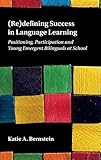(Re)defining Success in Language Learning : Positioning, Participation and Young Emergent Bilinguals at School / Katie A. Bernstein.
Material type: TextPublisher: Bristol ; Blue Ridge Summit : Multilingual Matters, [2020]Copyright date: ©2020Description: 1 online resource (200 p.)Content type:
TextPublisher: Bristol ; Blue Ridge Summit : Multilingual Matters, [2020]Copyright date: ©2020Description: 1 online resource (200 p.)Content type: - 9781788928991
- 9781788929004
- Education, Bilingual -- United States -- Case studies
- English language -- Study and teaching (Preschool) -- Foreign speakers
- English language-Study and teaching (Preschool)-Foreign speakers
- Language arts (Preschool) -- United States -- Case studies
- LANGUAGE ARTS & DISCIPLINES / Linguistics / General
- Classroom discourse
- Early childhood education
- English language learning
- English-medium US pre-kindergarten
- SLA
- Young second language learners
- emergent bilinguals
- language assessment
- multilingual learners’ translingual practices
- second language acquisition
- second language learners in preschool
- successful language learning
- translanguaging
- young learners
- 372.6521049 23/eng
- PE1128.A2
- online - DeGruyter
| Item type | Current library | Call number | URL | Status | Notes | Barcode | |
|---|---|---|---|---|---|---|---|
 eBook
eBook
|
Biblioteca "Angelicum" Pont. Univ. S.Tommaso d'Aquino Nuvola online | online - DeGruyter (Browse shelf(Opens below)) | Online access | Not for loan (Accesso limitato) | Accesso per gli utenti autorizzati / Access for authorized users | (dgr)9781788929004 |
Browsing Biblioteca "Angelicum" Pont. Univ. S.Tommaso d'Aquino shelves, Shelving location: Nuvola online Close shelf browser (Hides shelf browser)
Frontmatter -- Contents -- Figures, Tables and Images -- Acknowledgements -- Transcription Symbols -- Introduction -- 1 Participation in Interaction and Language Learning: A Layered Approach -- 2 Language and Language Learning as Social Practice -- 3 From Bhutan, Uzbekistan and Berkeley to River City: Arrival Stories -- 4 Adults as Context-makers: Parents’ and Teachers’ Beliefs about Language -- 5 The Social Field of Classroom Three: Policies and Practices -- 6 Becoming Students, Becoming Speakers: Positioning in the Social Field of Classroom Three -- 7 Who Learned What? Three Perspectives on Success in Language Learning -- 8 Beyond English: Multimodal, Multilingual Repertoires at Work -- 9 The Edge Has its Advantages: Participation and Learning on the Periphery -- 10 Concluding Thoughts: Success Stories -- Appendix 1: Details about Conflicts that Brought Classroom Three Families to the United States and their Experiences with Resettlement -- Appendix 2: Detailed Methodological Information -- References -- Index
restricted access online access with authorization star
http://purl.org/coar/access_right/c_16ec
This book follows four emergent bilingual students in an English-medium pre-kindergarten in the US and examines how students’ differing social positions in the classroom shaped their participation in interaction and, thus, their English language learning across a school year. With a unique focus on both processes and outcomes, the book highlights language strategies that are often overlooked if the focus is solely on one language or on group participation, and it emphasizes the importance of assessment choice in shaping which learners appear to be successful. It is a powerful argument for recognising the translingual and multimodal abilities of learners, even in education which is officially English-medium and monolingual.
Mode of access: Internet via World Wide Web.
In English.
Description based on online resource; title from PDF title page (publisher's Web site, viewed 25. Jun 2024)









